Analysis of Psalm 80
Isaac Watts 1674 (Southampton, Hampshire) – 1748 (Stoke Newington, Middlesex)
The church's prayer under affliction; or, The vineyard of God wasted.
Great Shepherd of thine Israel,
Who didst between the cherubs dwell,
And lead the tribes, thy chosen sheep,
Safe through the desert and the deep;
Thy church is in the desert now,
Shine from on high and guide us through;
Turn us to thee, thy love restore,
We shall be saved and sigh no more.
Great God, whom heav'nly hosts obey,
How long shall we lament and pray,
And wait in vain thy kind return?
How long shall thy fierce anger burn?
Instead of wine and cheerful bread
Thy saints with their own tears are fed:
Turn us to thee, thy love restore,
We shall be saved, and sigh no more.
Hast thou not planted with thy hands
A lovely vine in heathen lands?
Did not thy power defend it round,
And heav'nly dews enrich the ground?
How did the spreading branches shoot,
And bless the nations with the fruit!
But now, dear Lord, look down and see
Thy mourning vine, that lovely tree.
Why is its beauty thus defaced?
Why hast thou laid her fences waste?
Strangers and foes against her join,
And every beast devours the vine.
Return, Almighty God, return,
Nor let thy bleeding vineyard mourn;
Turn us to thee, thy love restore,
We shall be saved, and sigh no more.
Lord, when this vine in Canaan grew,
Thou wast its strength and glory too;
Attacked in vain by all its foes,
Till the fair Branch of Promise rose:
Fair Branch, ordained of old to shoot
From David's stock, from Jacob's root;
Himself a noble vine, and we
The lesser branches of the tree.
'Tis thy own Son; and he shall stand
Girt with thy strength at thy right hand;
Thy first-born Son, adorned and blest
With power and grace above the rest.
O for his sake attend our cry,
Shine on thy churches lest they die;
Turn us to thee, thy love restore,
We shall be saved, and sigh no more.
| Scheme | x xxaa xbCC ddee ffCC gghh iijj kkxx exCC bbll iijj mmnn ooCC |
|---|---|
| Poetic Form | |
| Metre | 01011001010101110 11011100 11010101 01011101 11010001 11100101 11110111 11111101 11110111 1111101 11110101 01011101 11111101 01110101 11111111 11111101 11110111 11110111 01010101 111100111 0110101 11010101 01010101 11111101 11011101 11110101 11110101 10010101 0100101001 01010101 11110101 11111101 11110111 11110101 11110101 01011111 10111101 11011111 11011101 01010101 01010101 11110111 11111111 11110101 110010101 111101101 11110111 11111101 11110111 |
| Closest metre | Iambic tetrameter |
| Characters | 1,780 |
| Words | 342 |
| Sentences | 19 |
| Stanzas | 13 |
| Stanza Lengths | 1, 4, 4, 4, 4, 4, 4, 4, 4, 4, 4, 4, 4 |
| Lines Amount | 49 |
| Letters per line (avg) | 29 |
| Words per line (avg) | 7 |
| Letters per stanza (avg) | 107 |
| Words per stanza (avg) | 26 |
Font size:
Submitted on May 13, 2011
Modified on March 05, 2023
- 1:44 min read
- 125 Views
Citation
Use the citation below to add this poem analysis to your bibliography:
Style:MLAChicagoAPA
"Psalm 80" Poetry.com. STANDS4 LLC, 2024. Web. 28 Apr. 2024. <https://www.poetry.com/poem-analysis/19824/psalm-80>.


Discuss this Isaac Watts poem analysis with the community:
Report Comment
We're doing our best to make sure our content is useful, accurate and safe.
If by any chance you spot an inappropriate comment while navigating through our website please use this form to let us know, and we'll take care of it shortly.
Attachment
You need to be logged in to favorite.
Log In